Professor Ali Dhansay, NSTF Chair
The NSFT celebrates 25 years
The National Science and Technology Forum (NSTF) has a long history as part of democratic South Africa. From 1991, the precursor for the NSTF, called the Science and Technology Initiative, was part of the negotiations held during the Convention for a Democratic South Africa (CODESA). The NSTF was consequently founded in 1995. Its then-mandate was to oversee the establishment of a democratic and inclusive science system.
This year is the 25th anniversary of the NSTF, now a national stakeholder body representing organisations involved in science, engineering, technology and innovation (SETI). The NSTF continues to have ongoing input into national policy and planning processes. One of its primary mandates is to hold discussion forums for an ongoing exchange between the SETI community and government.
“It’s the largest, oldest and most representative stakeholder body of its kind. It represents more than 100 organisations, councils and institutions nationally and spans both the private and public sectors,” says Ms Jansie Niehaus, NSTF executive director. “The NSTF is an independent SETI platform, an essential element of an active democracy and an important part of the collaboration process needed in SETI.”
This not-for-profit organisation has seven membership sectors: business (including SMMEs and business associations), civil society and labour, government, higher education, professional bodies and learned societies, science councils and statutory bodies, and state-owned enterprises. (For the full list, look under membership on www.nstf.org.za.)
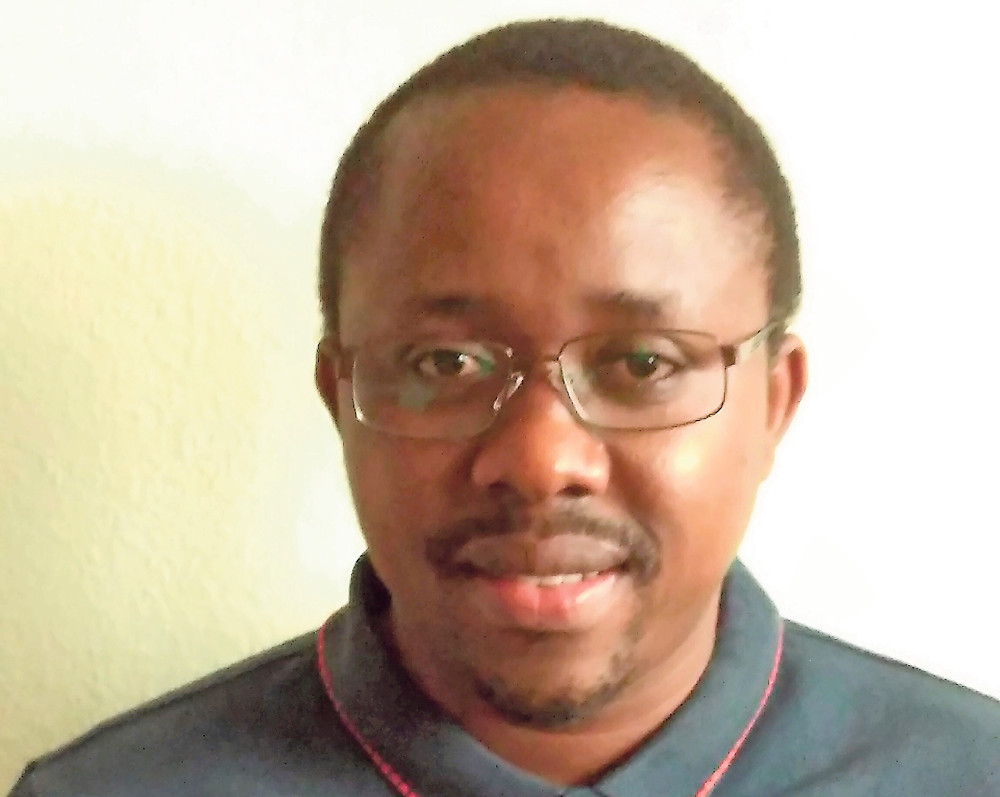 Dr Mpho Lekgoathi, NSTF vice-chair
Dr Mpho Lekgoathi, NSTF vice-chairWithin this SETI stakeholder group, there are researchers in various disciplines, engineers, entrepreneurs and innovators, technologists and technicians, administrators and managers, and academics and educators.
NSTF’s role in the SETI landscape
The NSTF’s work centres around representing SETI organisations through three main areas: networking stakeholders and engaging government departments around SETI-related issues, promoting SETI, and liaising with government on behalf of stakeholders. These areas then expand into various activities.
Recognising excellence in SETI
The annual NSTF-South32 Awards began in 1998 and are now considered South Africa’s ‘Science Oscars’. They recognise and celebrate excellence within SETI sectors, rewarding the efforts and contributions of top scientists and related professionals in South Africa. The awards are also used as a mechanism to promote SETI achievements to the youth and to the general public. There are two associated youth outreach programmes: the NSTF Share ‘n Dare Programme (where award winners share their knowledge) and the NSTF Brilliants Programme (which recognises top physical science and mathematics students.
Unified voice for SETI community around policy issues
The NSTF is collaborative space to engage around SETI policy and related issues. One of the ways it does this is with NSTF Discussion Forums. Run like short conferences, the topics are of cross-cutting relevance to the SETI community. Some recent topics include:
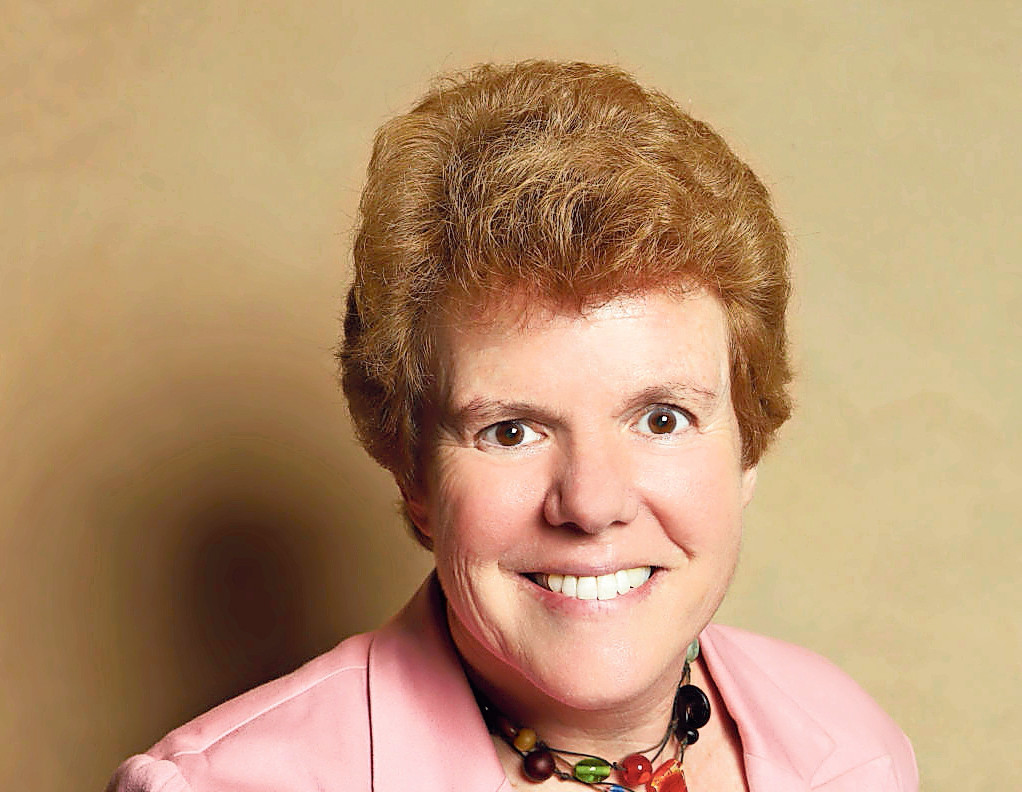 Jansie Niehaus, NSTF Executive Director
Jansie Niehaus, NSTF Executive Director• Investigating the 4IR technologies needed for manufacturing and minerals processing
• Looking at how the career paths for researchers has changed, from embracing broad science and complexity to systems thinking and entrepreneurship
• Understanding the complexity of plastics pollution in the South African context
Single SETI platform for all sectors and disciplines
“The NSTF’s aim is to create a collaborative space where the different sectors and disciplines can share information and engage with each other,” explains Niehaus. To add cohesion, the organisation sends out a monthly e-newsletter about SETI-related public policies, events and other SETI-related news.
As part of representing the SETI community, the NSTF collates available bursaries and bursary providers as an online source. (It’s under the ‘Bursary’ section on the NSTF website.) Further online youth engagement offers career information and role model profiles. The NSTF Bursary Directory and SETI Careers initiative was implemented with funding from the United Nations Educational, Scientific and Cultural Organization (UNESCO) and the DSI in 2011.
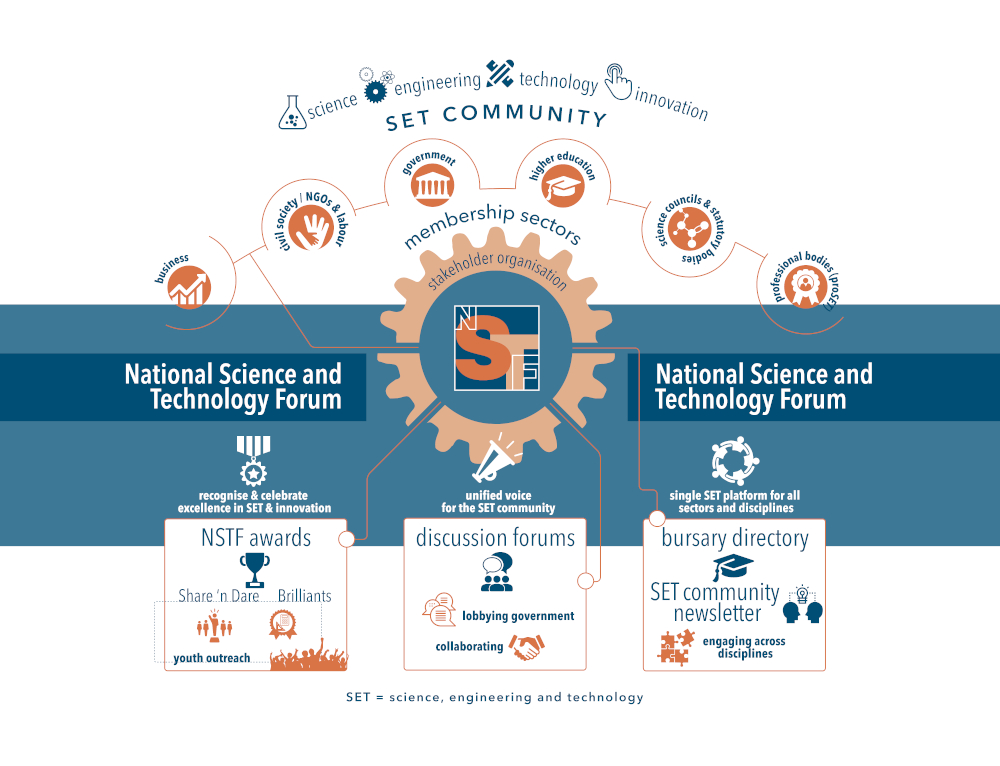
The NSTF is also involved with various projects, primarily with the DSI. Recent examples include an NPO support programme for organisations led by black women. The NSTF also trains young science graduates from the DSI’s National Youth Service and National Research Foundation Internship Programmes. This began in 2006.
From present to the future
“We are proud to have reached the important milestone of 25 years,” says Niehaus. “It has come at a very relevant time for SETI. Lessons from the Covid-19 pandemic show us that it’s more important than ever to debate the linkages between science, technology and society, the various causes and effects, the unintended consequences, and whom it benefits. As important is for everyone to be informed, including the public, the decision makers, the scientists and other SETI professionals.”
The landscape of the National System of Innovation can be fractured. The NSTF represents most of the disparate research and information structures and creates a collaborative multi-disciplinary space. Niehaus notes that the NSTF is one of the few SETI entities that operates as an independent platform where bridges can be built – between science and education, between engineering and science, and between parts of government and science, and so on.
Future plans include representing even more SETI organisations in South Africa and developing stronger engagement with government departments. The NSTF is also creating international collaborations, such as partnering with the Triple Helix Association which aims to develop university-industry-government interactions to foster research, innovation, entrepreneurship and regional sustainable development.
The NSTF will be hosting, on behalf of South Africa, a virtual panel as part of the international conference ‘ISPIM connects global – celebrating the world of Innovation’. This is an initiative by the International Society for Professional Innovation Management held continuously during 24 hours around the world. The conference runs from 6-8 December 2020 and the South African panel discussion led by the NSTF is on 7 December 2020 and is looking at ‘Lessons in innovation from South Africa’. (Go to www.ispim-connects.com for details.)
A focus on professional bodies and learned societies
Professionals in science, engineering and technology (SET) is a sector of the NSTF titled proSET. It consists of professional bodies and learned societies that represent professionals in various fields. The NSTF proSET focuses on facilitating cooperation among professional organisations regarding SETI and education, among other areas.

proSET reference guide
A project (soon to be launched) is the proSET guide which details its member organisations. The aim is to build this into a handy reference of all professional societies operating within SETI and SETI education. It will include an overview of the SETI environment in South Africa and the role that various SETI professions play.
“This will enable various stakeholders to connect and collaborate, such as young graduates using the reference guide to build their professional networks,” says Mr David Botha, co-chair of proSET.
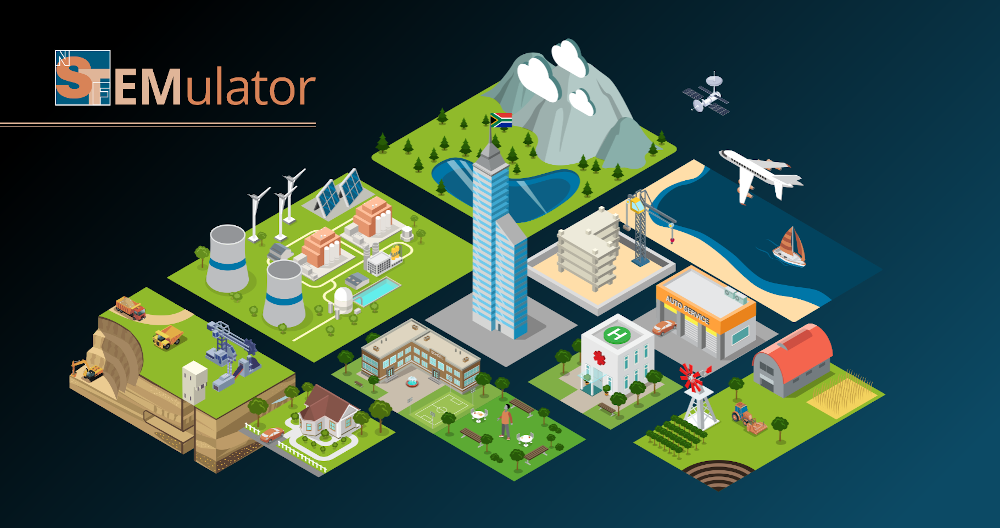
The STEMulator
The STEMulator is a virtual exploratorium of animated STEM (science, technology, engineering and mathematics) educational exhibitions.
“It is designed to ignite a spark of curiosity in young minds. In the STEMulator you can explore how things work, and the science and engineering behind them,” explains project lead, Mr Richard Gundersen. “STEM careers related to the ‘exhibits’ are also explained. The development of the STEMulator is ongoing as we want to include as many aspects of STEM as possible.” Find it at www.stemulator.org.
The ‘Science Oscars’ – the NSTF-South32 Awards
The National Science and Technology Forum (NSTF) has held annual awards since 1998. Named the NSTF-South32 Awards and considered South Africa’s “Science Oscars”, they recognise excellence within the science, engineering, technology and innovation (SETI) sectors. It’s been 22 years of rewarding the efforts and contributions of top scientists and related professionals in South Africa.
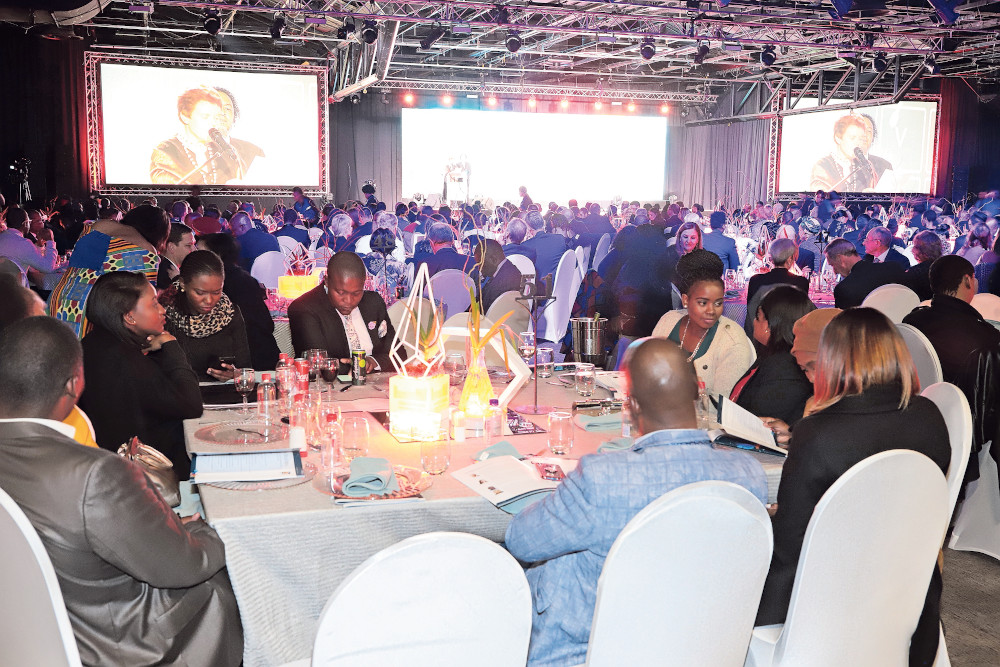 The Gala Dinner goes online: Above shows the 2019 Gala dinner. This year the Gala event was online and live-streamed because of the Covid-19 pandemic. The QR code will link you to the edited highlights: https://www.youtube.com/watch?feature=youtu.be&v=eHX9t3gG710
The Gala Dinner goes online: Above shows the 2019 Gala dinner. This year the Gala event was online and live-streamed because of the Covid-19 pandemic. The QR code will link you to the edited highlights: https://www.youtube.com/watch?feature=youtu.be&v=eHX9t3gG710
The NSTF-South32 Awards are national and open to everyone (they were the first of this type.) The awards are also collaborative, created for and adjudicated by the community. They encourage the involvement and participation of SETI organisations in research, and this includes business. The awards patron is the Minister of Higher Education, Science and Innovation, Dr Blade Nzimande.
Contributions are recognised in these areas:
• Scientific research
• Management of SETI and innovation
• Capacity building in engineering research
• Water management solutions
• Environmental sustainability and biodiversity conservation
• Data for research
• Innovations and their research and/or development
• Science communication and creating awareness
• Non-governmental organisation (NGO) activities, which could include technology transfer activities, and education and training
• A special annual theme award
The awards provide space for individuals, teams and organisations, the latter being corporate, non-profit and SMME organisations. Junior and senior individuals are also recognised. This year marks 247 winners, inclusive of individuals, teams and organisations. Of the individual winners, 35% have been women and 39% represent previously disadvantaged people.
Award winners as SETI role models
The awards play an important role in raising awareness among the general public and youth about local research and its relevance. Besides the awareness around the awards, there’s a partnership with the South African Journal of Science (SAJS) where NSTF Award winners can submit commentaries.
There is also an associated outreach programme called NSTF Share ‘n Dare. It is a targeted intervention to promote the winners’ work and to showcase role models for SET and innovation. It includes significant outreach work, such as talks, knowledge sharing, and career advice, as well as raising awareness among the public through the media. The programme has been running since 2009.
Promoting science and maths
Beginning in 2001, there is another initiative associated with the annual awards called the NSTF Brilliants Programme. It focuses on the top science and mathematics matriculants from public schools from the previous year — a man and a woman from each of the nine provinces. Top marks really mean top marks: above 90%. The programme involves at least 18 first-year students who are studying in the science, medicine and engineering fields.
The programme aims to motivate these students to complete their studies and then pursue SETI-related careers. It enables access to potential role models and mentors, and advice from experts who can address their study and career concerns. It also exposes the students to science and engineering in the field and contact with experts.
When Covid-19 isn’t upturning the normal, the Brilliants students are sponsored to get to the awards and are then recognised and applauded at the NSTF-South32 Awards Gala Dinner. There is also an educational tour in a SETI-related industry and a motivational speakers’ programme.
The Department of Science and Innovation provides a bursary fund for the NSTF Brilliants Programme and other selected students. This gives once-off top-up funding if the students don’t have full bursaries for their first-year expenses.
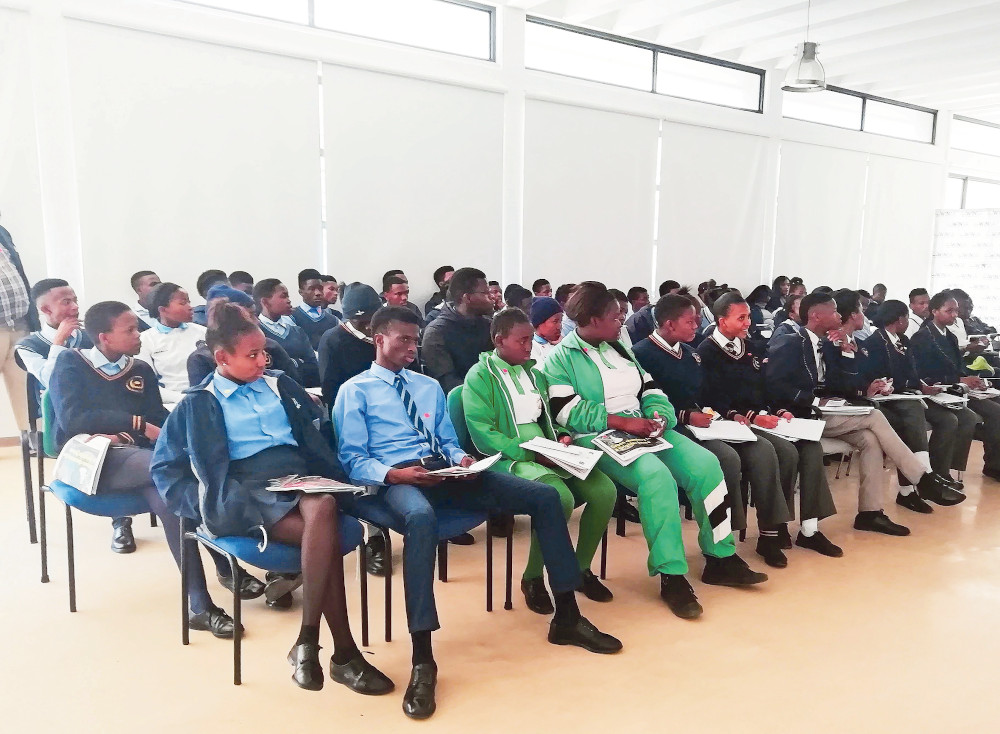 Usually NSTF-South32 Award winners go out into the community to present and engage, with a focus on the youth. However, with Covid-19, this engagement has been brought online. The QR code will link you to this year’s online talks: https://www.youtube.com/playlist?list=PL4z1BKAYN2zyO1YL5wN6Uts1A8VFijlk2
Usually NSTF-South32 Award winners go out into the community to present and engage, with a focus on the youth. However, with Covid-19, this engagement has been brought online. The QR code will link you to this year’s online talks: https://www.youtube.com/playlist?list=PL4z1BKAYN2zyO1YL5wN6Uts1A8VFijlk2
Message of Support
The Department of Science and Innovation (DSI) has had support from the National Science and Technology Forum (NSTF) from inception and I’m not sure people are aware of this. The 25th anniversary of the NSTF is a celebration of the many years that we have worked together.
When we started as the Department of Arts, Culture, Science and Technology, there was a fragmented science community. It was a new government and, consequently, a new journey. We needed to bring the science community together and the only mechanism we had was the NSTF. This set the tone for how the Department engaged with the science, engineering, technology and innovation (SETI) community for many years. An example is the first science, technology and innovation White Paper in 1996, part of its success is due to the tone, engagement and transparency between all the stakeholders. The NSTF has always been part of the engagement and have helped the Department across the years of policy development. The organisation is a forum to learn more about what the government is thinking. In the same way, there has always been excellent feedback from the NSTF about what the SETI community is thinking. None of this is taken for granted by the Department.
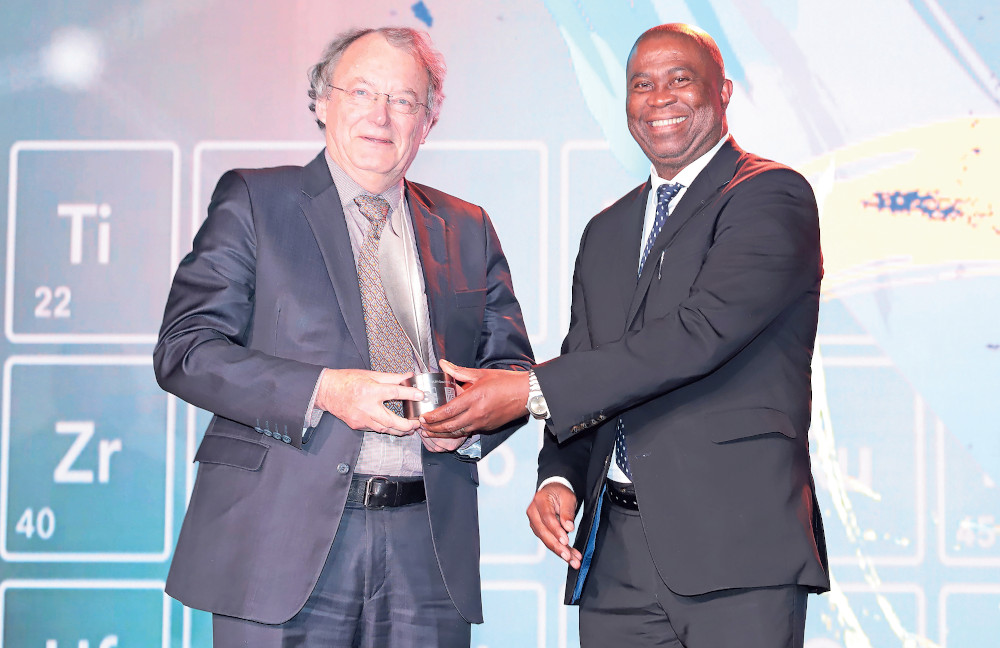 Lifetime Award Winner Professor Robin Crewe and Director-General Dr Phil Mjwara, Department of Science and Innovation, at the 2019 NSTF-Souoth 32 Awards
Lifetime Award Winner Professor Robin Crewe and Director-General Dr Phil Mjwara, Department of Science and Innovation, at the 2019 NSTF-Souoth 32 Awards
Going back to the early years, we could see the positive outcomes (of the government programmes) as the SETI community responded to national strategies. This success needed to be rewarded and, once again, the NSTF came through with their awards (now called the NSTF-South32 Awards). These have been running for 22 years. The Department is impressed with increased representation of the awards recipients. The NSTF worked hard on the profiles, ensuring that younger and upcoming members of the community are recognised. The NSTF can be proud of their contribution to transformation in the SETI community.
The DSI is serious about encouraging younger people and we’re delighted with the work that the NSTF does. You cannot underestimate the impact of the NSTF Brilliants and Share and Dare programmes. (These are youth engagement programmes that involve outreach into the community and raising the profile of SETI.) I can still see the young Brilliants recipient saying that just standing in front of all these highly respected scientists encouraged him to want to do more.
Yearly we have the Science Forum South Africa as a platform to connect further with our SETI community as well as like communities across the continent. One of the ways South Africa is an example and a leader is by showing the importance of having a platform such as the NSTF. This is an independent space where the SETI community can engage and hold discussions.
We would also like to thank the NSTF for being a nurturing environment for some of the organisations that we focus on. Two examples are Black Women in Science and Nka’Thuto Edu Propeller. The Department wanted a home for young science graduates where they can network and create a larger profile within the SETI environment. This has been extremely valuable to us and is part of an incubation process.
We are now finalising our decadal plan on science, technology and innovation. There will be new proposals and a range of programmes happening in the next few months. We see the NSTF playing an important role in the transition and this includes bringing public-private partnership players into the programme.
Promoting dialogue
Part of the National Science and Technology Forum (NSTF) mandate is to hold regular policy-related discussions, including on burning issues within the science, engineering, technology and innovation (SETI) community. Since 1995, these events have promoted dialogue among SETI stakeholders — including between the public and private sectors, between government and other stakeholders, and between experienced SETI professionals and the youth.
The discussion forums provide a non-partisan space for the SETI community to monitor related policies and to provide feedback on these and other policy issues to government, the public and the rest of the community. Represented sectors include higher education where many researchers reside, business, science councils and statutory bodies, government and civil society.
Additional SETI policy resources
The NSTF’s monthly newsletter has been sent out since 1998. Over the years it has become a resource, containing SETI-related news and SETI policy news; it serves as a monthly snapshot of what’s happening in science in South Africa. (To subscribe, go to www.nstf.org.za.) Furthermore, the National Development Plan (NDP) has been summarised from a SETI perspective. Find it on the NSTF website under news/set policy.
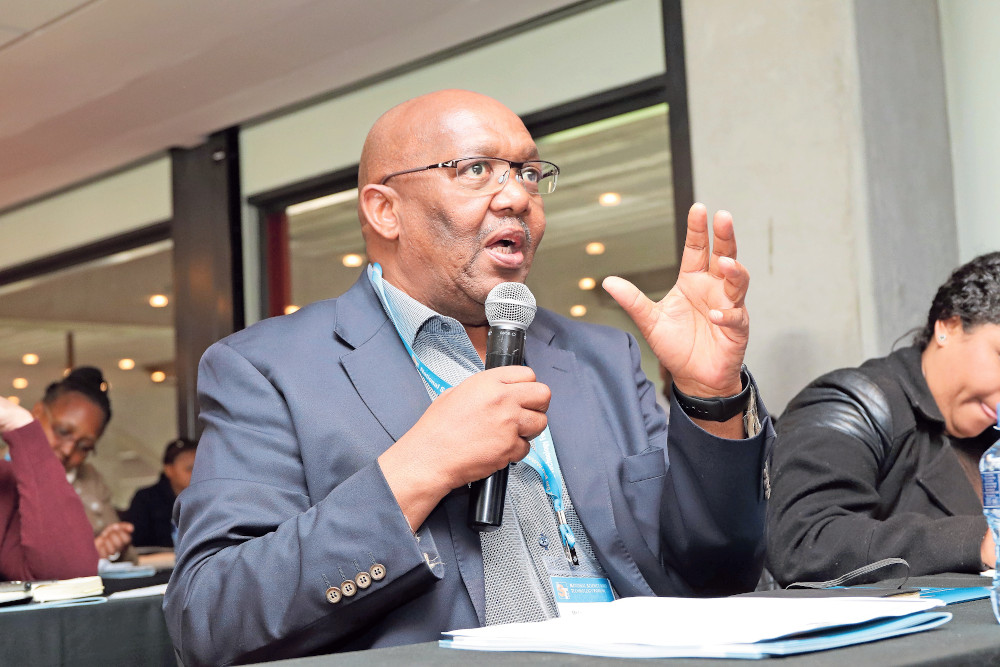 Solomon Lechesa Tsenolo, Deputy Speaker of the National Assembly, Parliament South Africa
Solomon Lechesa Tsenolo, Deputy Speaker of the National Assembly, Parliament South Africa
Excerpts from media releases
The following are excerpts from media releases about specific discussion forums. These relate to the theme of the fourth industrial revolution (4IR), an important SETI-related topic that affects all people and industries in South Africa.
The 4IR has huge potential to improve operations in various industries, in education, and in people’s lives. Part of the NSTF’s vision is a transformed country where SETI contributes to a high quality of life for all who live in South Africa, as well as where the education system is effective, particularly regarding performance in SETI subjects and promoting innovation.
Manufacturing and minerals processing – 4IR technologies South Africa needs to acquire
The NSTF Discussion Forum was part of Science Forum South Africa, an annual initiative of the Department of Science and Innovation in December 2019.
NSTF Discussion Forum report-back: When it comes to 4IR and manufacturing, the concern is that South Africa is, in general, far behind its BRICS partners (Brazil, Russia, India, China, and South Africa).
Industry 4.0 can be seen as the intersection of manufacturing, automation, and ICT systems to create a pathway for increased efficiencies, better production, decreased cost of production, and the subsequent benefits. It holds the potential for very small localised production and what this can do for the economy. Think living room scale and micro industries using 3D printers and other technologies.
The World Economic Forum Report on “Readiness for the Future of Production” examines 12 emerging technologies for 4IR, including: artificial intelligence (AI) and robotics; Internet of Things; virtual and augmented reality; additive manufacturing; blockchain and distributed ledger technologies; advanced materials and nanomaterials; and energy capture, storage and transmission. To be efficient and competitive, the South African manufacturing industry will have to implement at least some of these technologies. The “how it is done” is key. It’s possible to transition without losing jobs, so there needs to be a clear strategy that includes upskilling.
The BRICS South African Working Group has a number of proposals. One of these is a technology bank for protecting intellectual property (IP) with the next step of facilitating manufacturing within the country. South Africa can’t continue to primarily import technologies. There is a need to use homegrown IP to create new technology, and to customise imported technologies while including local resources and locally developed material.
The Working Group suggests developing frameworks for regulation and ethics. Other proposals include the need for the appropriate digital infrastructure (such as connectivity, inexpensive data and a secure power supply) and the relevant cyber security and associated qualifications.
Looking at skills, feedback from the discussion forum shows concern over how long it takes to develop courses and qualifications. This could lead to even bigger skills gaps if it is not addressed. It’s also imperative to develop a critical thinking mindset.
Other proposals involve students, while studying, having the opportunity to be entrepreneurs and to involve themselves more in industry. Ideas and education aren’t enough: South Africa needs people who can implement their ideas.
Developing skills for 4IR technologies must put people at its centre and show they will not be left behind. This means communication — sharing what is happening with the reasoning and the pathways for skills development. In South Africa, there is a large population of unemployed people who need to be part of the solution. The consensus is that digital literacy and education, in general, are key, with the need to develop a culture of lifelong learning and self-development.
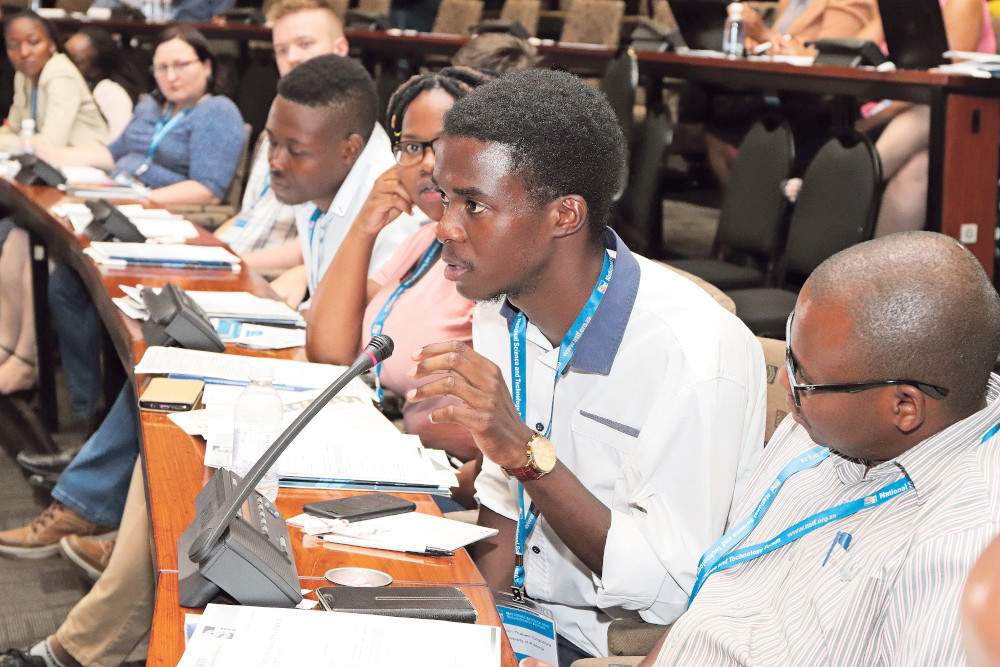 Delegates at the NSTF Discussion Forum on ‘Career paths for researchers – where to in a changing world?’ from 2-3 December, 2019. For details, go to www.nstf.org.za/discussion-forum/researcher
Delegates at the NSTF Discussion Forum on ‘Career paths for researchers – where to in a changing world?’ from 2-3 December, 2019. For details, go to www.nstf.org.za/discussion-forum/researcher
Communication needs to be an exchange and it cannot be top down. The advice was to go to people where the challenges exist. Communities know what the issues are and have a handle on solutions that take multiple factors into account, but they need partners.
Find more information at www.nstf.org.za/discussion-forum/ibsfsa-session
Advanced manufacturing and automation: potential and challenges
This NSTF Discussion Forum addressed how new technologies, and 4IR in general, have the potential to revolutionise manufacturing industries in South Africa. The three-day event was conducted in partnership with the NSTF proSET sector (professional bodies and learned societies) and ran from 11-13 September 2019.
NSTF Discussion Forum report-back: Manufacturing industries in South Africa need very specific skills. This is an environment where companies have to continuously improve efficiencies and productivity to stay in business. It’s a sector that embraces technology and where 4IR technologies are already being deployed.
The term “4IR” can be understood as cyber-physical systems, networks, and AI embedded in new ways within larger societies, communities, and even in the human body. Industry 4.0 can be seen as connecting embedded system technologies and smart processes to radically transform industry and production value chains and business models.
When it comes to people and the concern that robots will replace people in factories, it was put forward that policies shouldn’t focus on protecting jobs, but on protecting the individual. There will be jobs, but employees will need higher-end skills such as programming, designing and developing apps.
Research published by the Department of Trade and Industry (DTI) in 2016 shows that manufacturing output volume has only increased marginally since 2004. Importing is the standard, with little exporting, and this needs to change. However, private investment challenges point to restrictive labour regulations, an inadequately educated workforce and poor work ethics in the national labour force. The DTI aims to grow the manufacturing sector as this is positioned as a particularly important sector for job creation, new business and skills development.
South African data, across industries, shows an increasing gap between skills demand and skills supply. The Intsimbi Future Production Technologies Initiative is a partnership between government and industry. The aim is skills development and enterprise competitiveness, focusing on the advanced manufacturing sector. Here industry has taken the lead.
South Africans are the innovators on this international pilot. It differs from other skills initiatives in how it operates. There is a country-level nodal network that sits on an ICT platform. The devices and data from the programme stream to this. The creation of large amounts of data and the analysis thereof (Big Data) allow AI and other 4IR technologies to play a significant role.
The learning pathways are centred around competencies needed by industry and customised to the individual. It’s about packaging curriculum content into frameworks that meet industry needs. Intsimbi is using existing international standards. Students work on modules and the training is free. Companies put their training material on the platform and provide equipment for the practical learning labs.
When it comes to manufacturing, South Africa has a role to play in developing appropriate technology that results in low-cost devices. It’s about context and responding to Africa-specific challenges.
Find more information at www.nstf.org.za/discussion-forum/am-and-auto/.
Implications of 4IR for SETI, industry, society, and education
The Fourth Industrial Revolution (4IR) themed event was held from 11-13 September 2018. The aim was to explore the collective understanding of 4IR.
NSTF Discussion Forum report back: A number of approaches to 4IR were proposed. One is that sustainable economic growth relies on productivity growth, which is driven by technological change. The idea is to focus on what needs to be achieved rather than the name. Globally these aims range from improving competitiveness and developing 4IR technologies to enhancing digital start-ups and ecosystems.
Another approach is understanding technological change as more evolution than revolution. Various 4IR technologies aren’t that new (for example, robotics). They should be integrated into organisational, sector and industrial strategies rather than seen as a massive change.
Another 4IR approach is to embrace choice and the shaping of our future, both collectively and individually. Society and technology can co-evolve with technology embedded in society.
For South Africa to be truly competitive, we need to take 4IR opportunities appropriate to our context. This includes creating industries around opportunities and ensuring affordable broadband connectivity. South Africa also needs to do its own technology R&D, as well as assimilate and adapt inbound technologies. Furthermore, it’s essential to build people’s capabilities and skills around technology.
There is a lot of anxiety around 4IR. One is ‘technology singularity’ where machines and artificial intelligence are so advanced, they surpass humans. However, the more immediate concern is job losses. Current thinking sees rote jobs as being the most vulnerable. The agreement is that there will probably be job losses, especially in the low-skilled sectors. Job creation will probably not match job losses, plus the nature of current jobs will evolve. This means education becomes critical, as does reskilling and upskilling. A national dialogue is needed.
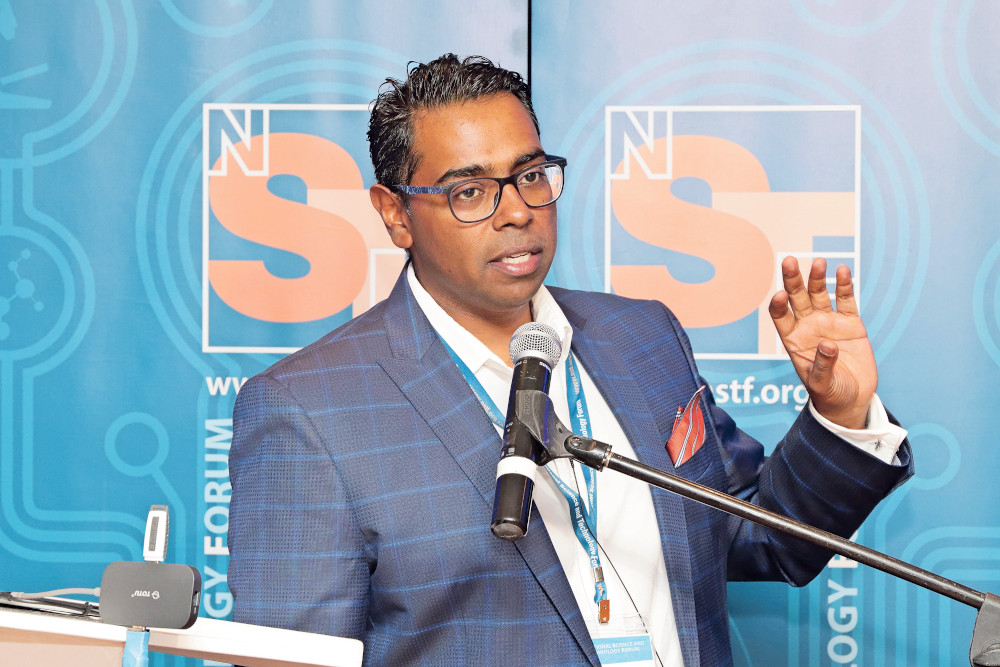 Yanesh Naidoo, Sales and Design Director at Jendamark, addressing the audience on ‘Opportunities for SA companies in the 4IR space’
Yanesh Naidoo, Sales and Design Director at Jendamark, addressing the audience on ‘Opportunities for SA companies in the 4IR space’
4IR is a key theme for government with numerous initiatives and strategies around it. Thematic areas cover: digital society, ICT policy, regulatory and legislative reforms; innovation, research and development; economic policy and inclusive growth; industrial restructuring and trade; labour market restructuring; education and skills development; and transforming government and service delivery. All this needs to be agile enough to keep up with the fast-changing pace of technology.
There is also a need for evidence-based research to inform decision making. Tackling big societal problems, such as high youth unemployment and water scarcity, will need collaboration (especially across government), multi-disciplinary partnerships and a regional perspective.
Find more information at www.nstf.org.za/discussion-forum/implications-of-the-4th-industrial-revolution-for-set-industry-society-and-education-4irsciza/